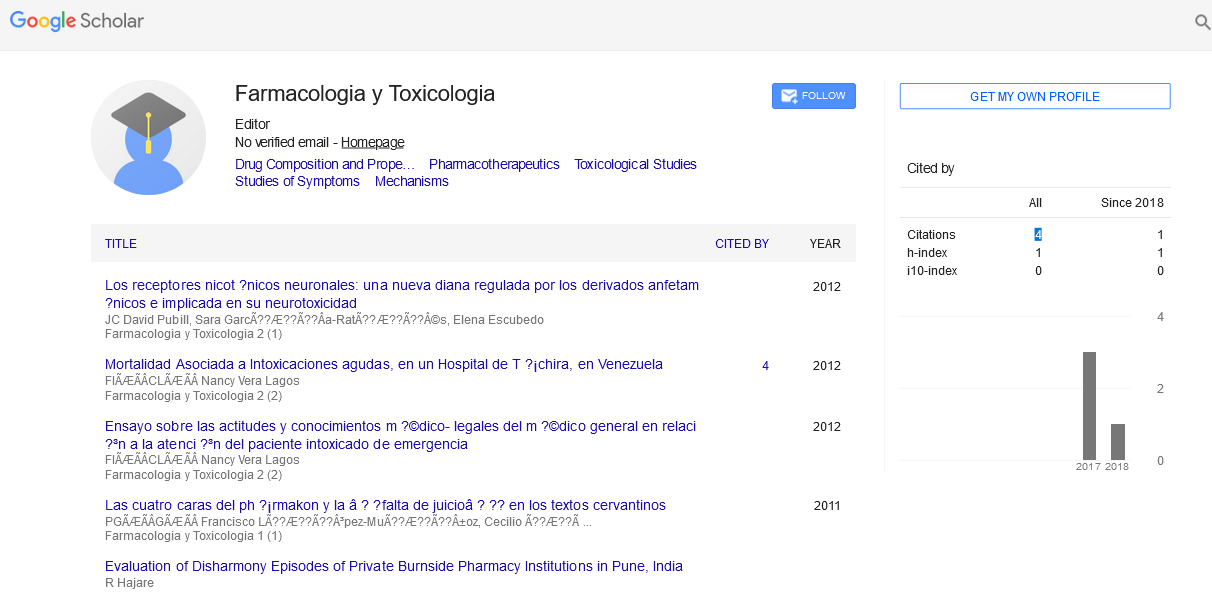Perspective - (2024) Volume 14, Issue 3
Pharmacotherapeutics: The Science of Medicinal Treatment
Michael Kundi*
Department of Pharmacology, University of Vierna, Wien, Australia
*Correspondence:
Michael Kundi, Department of Pharmacology, University of Vierna, Wien,
Australia,
Email:
Received: 04-May-2024, Manuscript No. IPFT-24-14773;
Editor assigned: 08-May-2024, Pre QC No. IPFT-24-14773 (PQ);
Reviewed: 22-May-2024, QC No. IPFT-24-14773;
Revised: 04-Jun-2024, Manuscript No. IPFT-24-14773 (R);
Published:
14-Jun-2024
Introduction
Pharmacotherapeutics, the branch of pharmacology
concerned with the therapeutic use of drugs, plays a pivotal role
in modern medicine. It encompasses a wide array of disciplines,
from drug discovery and development to the clinical application
of medications for treating diseases. Understanding
pharmacotherapeutics is crucial for healthcare professionals to
optimize patient care and achieve positive outcomes.
Description
Drug discovery and development
The journey of a drug from discovery to development is
intricate and requires collaboration between various scientific
disciplines. It begins with identifying potential drug targets
through basic research, followed by the design and synthesis of
molecules with therapeutic potential. These molecules undergo
rigorous preclinical testing, including in vitro and in vivo studies,
to assess their safety and efficacy.
Once a promising candidate is identified, it enters clinical
trials, which are conducted in multiple phases to evaluate its
safety, dosage, and effectiveness in humans. Regulatory
agencies like the Food and Drug Administration (FDA) closely
oversee these trials to ensure patient safety and the reliability of
data. Finally, if the drug successfully passes through all stages of
clinical development, it receives approval for marketing and
becomes available for clinical use.
Understanding pharmacotherapeutics
Pharmacotherapeutics, also known as pharmacotherapy,
focuses on the use of drugs and medications to treat diseases
and alleviate symptoms in patients. It encompasses a broad
spectrum of activities, including drug discovery, development,
regulation and clinical application. The primary goal of
pharmacotherapeutics is to achieve optimal therapeutic
outcomes with minimal adverse effects, tailored to individual
patient characteristics such as genetics, age, gender and
comorbidities.
Pharmacodynamics and pharmacokinetics
Pharmacotherapeutics delves into pharmacodynamics and
pharmacokinetics, two fundamental concepts that govern how
drugs exert their effects in the body. Pharmacodynamics
explores the mechanisms of drug action, including interactions
with cellular receptors and signaling pathways. Understanding
pharmacodynamics helps clinicians predict a drug's efficacy and
potential side effects, enabling them to make informed
treatment decisions.
On the other hand, pharmacokinetics focuses on how the
body absorbs, distributes, metabolizes and eliminates drugs.
Factors such as drug formulation, route of administration and
patient characteristics influence pharmacokinetic parameters,
affecting drug concentration and duration of action. By analyzing
pharmacokinetic profiles, healthcare providers can optimize
dosage regimens to achieve therapeutic goals while minimizing
adverse reactions.
Clinical application and patient care
In clinical practice, pharmacotherapeutics guides healthcare
professionals in selecting the most appropriate treatment for
individual patients. It involves assessing the patient's medical
history, conducting diagnostic tests and considering factors such
as age, gender, comorbidities and concomitant medications.
Based on this comprehensive evaluation, healthcare providers
tailor treatment plans to meet the patient's specific needs and
optimize therapeutic outcomes.
Furthermore, pharmacotherapeutics encompasses the
principles of rational drug use, emphasizing evidence-based
prescribing, monitoring and patient education. Healthcare
professionals strive to strike a balance between the benefits and
risks of medications, aiming to achieve maximal therapeutic
efficacy with minimal harm. Patient counseling regarding
medication adherence, potential side effects and drug
interactions is integral to ensuring the safe and effective use of
pharmacotherapy.
Precision medicine and pharmacogenomics
One of the most significant advancements in
pharmacotherapeutics is the emergence of precision medicine,
which aims to tailor medical treatment to the individual characteristics of each patient. Pharmacogenomics, a key
component of precision medicine, involves studying how an
individual's genetic makeup influences their response to
medications. By identifying genetic variants that affect drug
metabolism and efficacy, healthcare providers can personalize
treatment regimens, minimize adverse reactions and optimize
therapeutic outcomes.
Challenges and future directions
While pharmacotherapeutics offers numerous benefits, it also
presents several challenges. Drug resistance, medication errors,
adverse drug reactions and escalating healthcare costs are
among the key challenges faced by healthcare systems
worldwide. Moreover, disparities in access to medications and
limited availability of essential drugs in certain regions remain
significant hurdles. However, advancements in technology, such
as artificial intelligence, big data analytics and pharmacogenomic
testing, present opportunities to address these challenges
effectively. Despite significant advancements in
pharmacotherapeutics, several challenges persist in the field.
These include the rising prevalence of drug-resistant pathogens,
the high cost of drug development and the need for personalized
medicine approaches. Addressing these challenges requires
continued investment in research, innovation and
interdisciplinary collaboration.
The future of pharmacotherapeutics holds immense promise,
driven by advancements in science, technology and
collaborative research efforts. With the advent of precision
medicine, the era of one-size-fits-all treatment approaches is gradually giving way to personalized medicine tailored to
individual patient needs. Furthermore, the integration of
pharmacogenomics into clinical practice holds the potential to
revolutionize drug prescribing, leading to safer and more
effective medication regimens. Looking ahead, the future of
pharmacotherapeutics holds promise with emerging
technologies such as pharmacogenomics, precision medicine and
novel drug delivery systems. Pharmacogenomics aims to
personalize treatment regimens based on individual genetic
variations, optimizing drug efficacy and minimizing adverse
reactions. Likewise, precision medicine tailors therapies to
specific patient subgroups, enhancing treatment outcomes and
reducing healthcare costs.
Conclusion
Pharmacotherapeutics is a dynamic and evolving field that lies
at the intersection of science, medicine and patient care. It
encompasses the entire spectrum of drug discovery,
development and clinical application, with the ultimate goal of
improving patient outcomes. By understanding the principles of
pharmacotherapeutics and embracing innovation, healthcare
professionals can continue to advance the practice of medicine
and enhance the quality of care for patients worldwide. As we
continue to unravel the complexities of human biology and
disease mechanisms, pharmacotherapeutics will undoubtedly
remain at the forefront of medical innovation, shaping the
future of healthcare through precision medicine.
Citation: Kundi M (2024) Pharmacotherapeutics: The Science of Medicinal Treatment. Farmacologia Toxicologia Vol.14 No.3: 030





